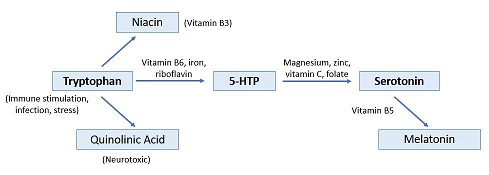Defeating Depression: A Holistic Approach

SYDNEY SPEER
Now, more than ever, society is being impacted by continually risingrates ofmental illness. Depression may be the leading reason for disability within the UnitedStatesfor people ages 15-44, affecting more than 16million Americans, andresultsinmore than48 000 suicides each year.1,2Effective treatment of depression requires a multi-faceted approachthataddressesunderlying causes and supportsthe whole person.
The first degree of health to address pertains to one's physiology, thus requiringanunderstandingofthe biochemical pathways affecting neurotransmitter formation.The physical system can be divided into 3macrosystems: neurotransmitters, neuroendocrine system ,and the organs of detoxification/immunity. One of the leading pathways utilized in depression treatment is the serotonin pathway. First-line pharmacology treatment, which includesselectiveserotonin-reuptake inhibitors , targets this pathway.Itis useful to also target it from a naturopathic approach.
Physical health is closely associated with emotional health,and dysfunction inside the physical being is often the real cause of mental illness. Physical health is linked to emotional health through thegut-brain axis, inflammation, poor digestion, decreased neurotransmitter production, increased quinolinic acid production, hormone imbalances , decreased detoxification/liver health, difficulty in remembering things consolidation,increasedamygdalaactivity, fear-based reasoning, andenvironmental exposures, includingheavy metals, mold,andinfectiousagents. Identifying the main cause can help improve depression outcomes.
Nutrition for Depression
The building blocks of mental health lie within nutrition. It is because what we place in our bodies includes a direct effect on the neurotransmitters and hormones that are needed to regulate our behavior and mood. One of many pathways that must definitely be attended to may be the tryptophan/serotonin pathway.

Foods to Eat
In general, an eating plan for depression ought to be full of raw fruits and vegetables, whole grains, raw nuts andseeds, and legumes. This type of diet will ensure adequate amounts ofamino acids, essential fatty acids,andcomplex carbohydrates to improve serotonin levels in the brain.3Thereare also3nutrients,particularly,that may provide support for depression.
The first is tryptophan, whichis a precursor to serotonin. It is an essential protein, meaning that the body do not produce it,soit should be provided through diet or supplementation.Tryptophan-rich foods ought to be emphasized, such asturkey, tuna, salmon , cashews, halibut, shrimp, oatmeal flakes, pork, avocado, cottage type cheese, wheat germ, eggs, collards, spinach, raisins, yogurt, chicken,and sweet potato.4
Vitamin B6-rich foods should also be increased, asvitamin B6 is really a cofactor needed forthe conversion oftryptophan to5-hydroxytryptophan . Foods full of B6 include watermelon, bananas, avocado, chicken, turkey, rainbow trout, sunflower seeds, halibut, sweet potato, potato, tuna, broccoli, brown rice, walnuts, oat bran, 100% bran cereal, feta cheese, salmon, beans,and millet.5
Increasing dietaryintake ofessential fatty acids, specifically omega-3s, canalsobe helpful for depression. Foods high in omega-3s includecold-water fish,walnuts,flax andchiaseeds, fish oil, vegetable oils , flaxseed oil,and black currantseedoil.6,7
It can also be important to ensure that the liver is working effectively to detoxify different hormones, neurotransmitters,andenvironmentalchemicals. Foods thatsupportliver detoxification include beets, cauliflower, cabbage, broccoli, kale, Brusselssprouts, carrots, artichokes, lemons, parsnips, dandelion greens, watercress,and burdock root.
Foods to prevent
When treating depression, the main emphasis should be around the supportive foundation foods mentioned previously. However, it's still vital that you encourage patients to lessen or eliminate foodsthat adversely affect mental health,such asalcohol, caffeine , processed foods,and foods high in saturated fats. It's also vital that you avoid foods containing aspartame or other sugar substitutes, which canblock the formation of serotonin and cause headaches, insomnia, and depression in individuals who are already serotonin deprived.8
High sugar intake significantly increases the risk of mental illness.9Patients with depression should ideally be consuming less than 36 grams of sugar a day.10My goal is perfect for patients to consume as little sugar as you possibly can; however, I additionally want to be realistic with patients, not idealistic.It's useful to teach patients how you can read labels and also to visualize 1 tsp for every 4 grams of sugar.
Wheat often seems to be a problem for all those with depression. Even though the exact mechanism is not known,some theoriesinvolvethe spraying of wheat with glyphosateand specificproteins in wheat,such as gliadin and gluten.11
Foodssuch aswheat and sugar can bring about food intolerances and leaky gut.11,12Itisalso useful to identify any additional food allergies and sensitivities through food sensitivity testing.
Supplementation for Depression
Supplementation is usually necessary for those who are experiencing depression. While using correct dose, form, androute ofadministration,too asavoiding the utilization ofnutraceutical and pharmaceuticalproductscontainingproblematic,non-medicinal ingredients,is imperativefor efficacious supplementation. Initially, it may be necessary to begin with higher doses to initiate the healing process and thentotaper down so the minimum dose has been used for the maximum benefit.
Supplementing the cofactorsfor serotoninbiosynthesis should bethemain focus of supplementation.
Vitamin B3: Tryptophan, the precursor to serotonin, can follow a number of different biochemical pathwaystomake different substances. The most preferential substancemade fromtryptophan is niacin, which is often used by every cell to make adenosine triphosphate . Once the body does not have enough niacinamide, tryptophan isdiverted away from the serotonin pathway and towardthe niacin pathway.13Vitamin B3 is available in3forms:niacin , niacinamide ,and inositol hexanicotinate.14Niacinamide may be the preferred formfor mental health support,as inositol hexanicotinate has not beenfound to beeffective for depression,and niacin often gives an uncomfortable flushing reaction as well as monitoring of liver enzymes if used over a long time.
Vitamin B6is a cofactor in the conversion of tryptophan to 5-HTP.The best-utilized form for depression and anxiety isthe active form of B6,pyridoxal 5'-phosphate.
Folateis needed in the final step of serotonin production,and it is best supplemented in the active form,5-methyltetrahydrofolate .15
Vitamin B12is availablein 3 forms; methylcobalamin, hydroxocobalamin, and cyanocobalamin. Themost easilyabsorbed formof B12is methylcobalamin.
Zincis best found in the zinc citrate orpicolinateforms.
Vitamin Cis required for the conversion of 5-HTP to serotonin andis alsoan essential nutrient.
Magnesiumcomes in many different forms. Magnesiumbisglycinateisthebestformfor mental healthbecause ofglycine'scalming properties.However, for patients with constipation, for example, I may use magnesium citrate.
Omega 3scan be separated into2groups:EPA and DHA .The number of n-3s to n-6s has an impact onmood.16Forthebest results with depression and anxiety,I strive for anEPA:DHAratioofeither 2:1 or 3:1.
Ironshouldideallybe delivered in the ironbisglycinateform, given its glycine component and the fact that it's non-constipating.
Vitamin B2 andVitamin B5are also important cofactors in the synthesis of serotonin.
Depression: Greater than a Physical Disorder
In addition toevaluatingbiochemicalcontributors todepression, it is also necessary to explorethe mental, emotional,and spiritualaspects of an individual.
A key priority inaddressingthe mental aspect is to teach patients how you can manage their mind, sothatthey are not subject to it. Most peoplecanget stuck in a thought-rut wherebytheirthoughts trigger an emotion, this emotion triggersanother thought, whichin turntriggers another emotion,and so forth. Often these thoughts bring us intoapit of depression. I make reference to this cycle because the thought-emotion cycle.Breaking this cycle of problematic thoughts iskeyto improvinga patient’s mental health.
One method to teachpatientshow to interrupt this cycle is as simple as explaining psychoneuroimmunology andhelping themunderstand thepotentialbiochemical impactof theirthoughts ontheirphysiology. The framework Iuse with themis called the “5 Rs,”adapted in the 4 Rs which i learned from Dr Jason Hughes:
- Recognizeyour thoughts.
- Refrainfrom following your thoughts by-
- Relaxinginto the breath.
- Resolveto repeat steps 1-3 and 5.
- Rephrase/Reaffirmthe thought you recognizedinto either a positive or neutral statement.
Aholistic method of depression requires treating the person rather than theirsymptoms,and addressing theirphysical, mental, emotional,and spiritual being.Dealing with the next 10fundamentals of healthcan lead to greatly improved mental health in your patients:
- diet/nutrients
- sleep
- exercise
- managing stress
- thoughts
- emotions
- behaviors and reactions
- environment, including chemicals, epigenetics, and neuroplasticity
- spirituality
- love and compassion for oneself
Case Study
LH, a 28-year-old female,given to the clinic with anxiety, depression, sleep dysfunction, premenstrual syndrome,and a history of a diet disorder.Current supplements and medications included 25 mg of sertraline and 400 mg of magnesiummalate/citrate for muscle pain.
Mental health monitoring forms from Dr ChristinePadesky'sbookMindOverMood17were completed, resulting in ascore of 42/72for anxiety,andascore of 45/57for depression.
Treatment
Initial treatmentrecommendationsfocused on increasing essential nutrients through diet andsupplementation, addressing sleep and exercise, and changing thought patterns:
- Niacinamide: 2 caps at breakfast
- Multi-B6: 1 cap at breakfast
- Magnesium bisglycinate: 2 caps at bedtime for anxiety, sleep, and depression
- Sleep hygiene suggestions
- Exercise: Daily movement that you simply enjoy
- Diet: Eat tryptophan-rich foods daily; eat protein at breakfast and lunch to balance blood sugar; increase water intake to 1 / 2 of your body weight in ounces, plus drink 2 cups of water for every mug of coffee consumed
- Seed cycling protocol for menstrual period and hormonal health to help reduce PMS18
- Daily gratitude journaling
- Do something you like to do every single day
- Spend a few minutes every day imagining yourself as energetic, healthy, etc
- Identify any suicidal thoughts as problematic, and view these thoughts as warning flags that in that moment you are not loving yourself. Shift to kindness.
The following blood tests were also ordered: CBC + Differential;Cholesterol panel ;Fastingglucose;Liver enzymes ;Bilirubin;Ferritin;TSH;anti-TPO antibodies;VitaminB12;Cortisol ;Estradiol;Progesterone .
One-Month Follow-up
At hersecond visit,LHreported that her stress and anxiety did not worsenupon learning that her partner lost his job; this response was unusual. Her sleep had improved, and she or he reported increased energy within the mornings.Exactly the same mental health-monitoring formsas used initiallyshowed slight improvements for depression and anxiety,with lots of 39/72 and 40/57,respectively.
Treatmentrecommendations in this appointmentwerebasedon lab resultsand teaching the 5Rs. Blood work results showed suboptimal vitamin B12 levels, low progesterone,and suboptimal cortisol.
The initial protocol was continued with the help of the following:
- Methylcobalamin: 2000 ug in the morning
- Herbal tincture including Hypericum perforatum, Avena sativa, and Passiflora incarnata, dosed at 2 tsp/day in the morning with water, 10 minutes away from food
- Vitamin D: 5000 IU once each day with food
- Evening primrose oil: 2 g two times a day on Days 15 to Day 1 of her next cycle for progesterone support
- Magnesium malate/citrate: 400 mg daily for muscle pain; increase to 400 mg twice daily on Days 33 to 35 for menstrual cramps
- Practice the 5 Rs of dealing with problematic thoughts
Two-, 3- and 4-Month Follow-ups
Treatment during the subsequent3visits focused oncounseling.
AtLH's2-month follow-up,therewerenoticeable improvements in her mental health scores:25/72and 17/57 for depression and anxiety, respectively. The individual also reported no cramps or PMS symptoms during her cycle.
At the3-month follow-up, LH reported stablemooddespitethe significant stress ofhaving a detailed friend attempt suicide.
By4months, theLHreported being anxiety-and depression-free,which wasalsoevidenced by a score of 14/72 for anxiety,along with a score of 17/57 for depression.
Addressing depressionusinga holistic, multi-modal approachcanlead to significant improvements in mental well-being,whichhavelasting outcomes in lots of patients' lives.19

